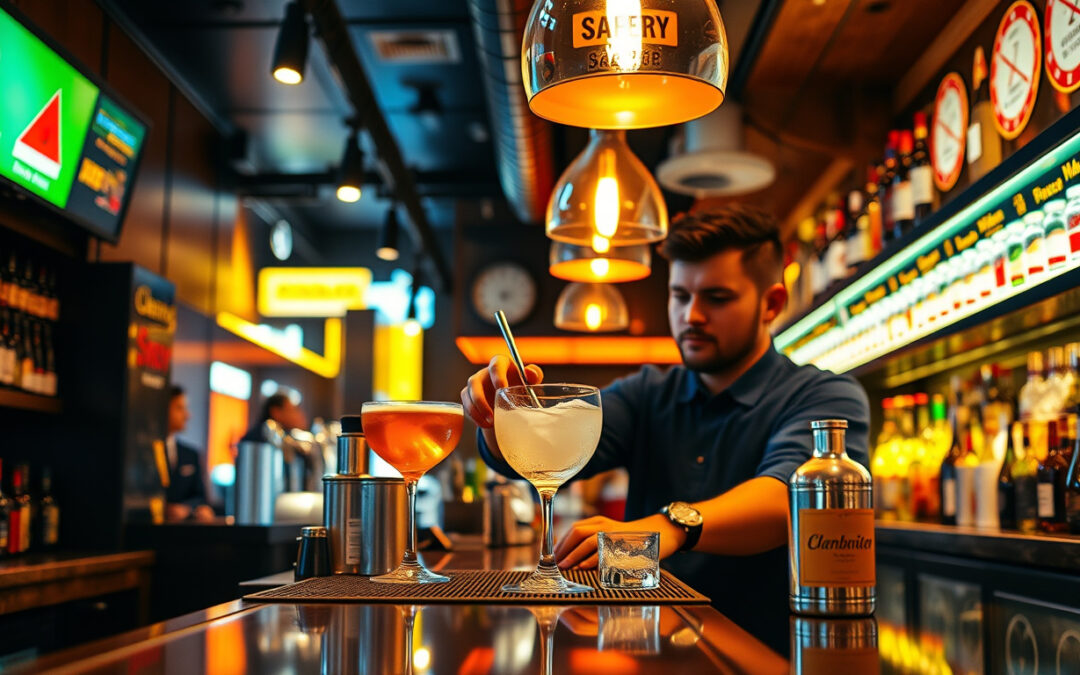In the hospitality industry, alcohol server safety matters. It protects customers and shields businesses from legal issues. Servers serve alcohol, watch for intoxication, and help prevent accidents. This article gives safety tips that lower risk, keep workplaces safe, and protect businesses.
Why Alcohol Server Safety Matters
Alcohol server safety means following clear rules, having good training, and showing careful behavior. Alcohol ups the risk of falls, fights, and drunk driving. Unsafe serving can hurt people and land a business in court. Strong safety methods help employees, patrons, and the community stay safe.
Key Risks Associated with Alcohol Serving Jobs
Before we list best practices, know the risks:
- Servers can cause more intoxication if not well trained.
- Alcohol may trigger violent or disruptive behavior.
- Nightlife settings lead to slips, trips, or fights.
- Serving minors or clearly drunk people can bring legal trouble.
These risks show why safety must come first in bars, restaurants, and clubs.
Essential Alcohol Server Safety Tips
To keep things safe and avoid accidents or lawsuits, servers and employers should follow these tips:
1. Complete Comprehensive Server Training
Good safety starts with proper training. Training teaches servers to:
• Spot signs of intoxication
• Know legal duties when serving alcohol
• Say no politely to extra drinks
• Handle rough or upset customers
• Check IDs to stop underage drinking
Many states require a training program. With training, servers grow confident and know how to serve alcohol safely.
2. Monitor Patrons Closely
Servers need to watch customers throughout their visit. They must see signs like:
• Slurred words or shaky movement
• Loud or rough behavior
• Confusion over orders
• Trouble walking steadily
By checking drinking patterns and controlling drink numbers, servers cut down the risk of heavy intoxication and accidents.
3. Refuse Service When Necessary
A key practice is to say no when needed. Over-serving risks harm and legal issues. When a customer shows signs of being too drunk, the server should:
• Politely refuse more drinks
• Explain that the rule guides the choice
• Offer water or a non-alcohol option
• Help set up a safe ride home if needed
This clear, calm refusal prevents fights and keeps the venue safe.
4. Maintain a Safe Workplace Environment
The physical space matters too. Employers must make the site safe by:
• Keeping floors clean and dry
• Lighting exits and stairs well
• Storing glassware and bottles securely
• Controlling crowd size during busy nights
A safe place helps servers work without extra hazards.
5. Encourage Team Communication
Safety grows when team members share and help each other. Managers and servers can:
• Meet often to discuss safety events
• Share notes on difficult patrons
• Support each other in tough situations
• Report risks or accidents right away
This teamwork builds quick responses and steady safety.
Additional Strategies to Prevent Liability
Besides these tips, businesses can use extra measures:
• Write a clear policy on alcohol service
• Post signs that remind customers to drink responsibly
• Use ID scanners to block underage sales
• Hold regular refresher training sessions
• Keep proper insurance for alcohol incidents
These policies show the business takes safety seriously and help in court.
Bulleted List: Top 5 Alcohol Server Safety Rules at a Glance
- Train each server well in alcohol rules and risks.
- Watch customers closely for signs of overdrinking.
- Refuse service firmly when a customer shows too much intoxication.
- Keep the environment safe to stop accidents.
- Communicate openly among staff about any concerns.
The Legal Implications of Ignoring Alcohol Server Safety
Ignoring good safety leads to big problems. For instance, serving a clearly drunk person who later crashes a car can put a bar under "dram shop" laws. Studies show that alcohol-involved car crashes claim many lives. In 2022, the CDC noted that nearly 30 people a day died in U.S. accidents tied to drunk driving. This fact stresses the need for strong server safety.
Educating servers and sticking to safety steps reduce these tragedies and protect business interests.
Frequently Asked Questions About Alcohol Server Safety
1. What is the most important alcohol server safety rule?
The most important rule is to refuse service when a patron looks intoxicated. Serving past a safe point risks harm and legal claims.
2. How can alcohol servers identify intoxicated customers?
Servers see intoxication with signs like slurred speech, shaky steps, aggressive behavior, confusion, or poor judgment. Training helps them learn these signs.
3. Why is alcohol server safety training mandatory in some states?
Training is required in many states so that servers grasp the legal and health sides of alcohol service. This training helps cut down on accidents and legal problems.
Conclusion
Alcohol server safety is a key part of serving alcohol responsibly. With proper training, close observation of patrons, firm refusal of dangerous service, and a safe workplace, businesses can lower accidents and legal risks.

A safety-first culture helps everyone—employees, customers, and the community. For owners and staff, putting safety at the center is not just smart; it is essential for success and legal protection.


